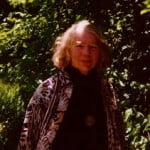by Thelma B. Freedman, M.A.
 The question has been asked, is past-life therapy primarily a clinical or a spiritual experience? Before this can be discussed, some definition of the word “spiritual” must be established. My Webster’s gives three relevant definitions: 1) of the spirit or soul; 2) of, or consisting of, spirit; not corporeal; and, 3) religious; sacred. As for the word “spirit” itself, one definition is “a supernatural being, as a ghost, angel, etc.” None of these definitions is very satisfactory, because there are words in them that could stand some defining, too; but I’ll use them as general guidelines. As for the word “clinical,” Webster’s is quite medical in its definition; I’ll use the broader and more common idea of treatment and help for people with problems either physical or psychological.
The question has been asked, is past-life therapy primarily a clinical or a spiritual experience? Before this can be discussed, some definition of the word “spiritual” must be established. My Webster’s gives three relevant definitions: 1) of the spirit or soul; 2) of, or consisting of, spirit; not corporeal; and, 3) religious; sacred. As for the word “spirit” itself, one definition is “a supernatural being, as a ghost, angel, etc.” None of these definitions is very satisfactory, because there are words in them that could stand some defining, too; but I’ll use them as general guidelines. As for the word “clinical,” Webster’s is quite medical in its definition; I’ll use the broader and more common idea of treatment and help for people with problems either physical or psychological.
The most important point, to me, is that these definitions of spirit and spiritual all lean heavily on the non-corporeal, supernatural aspects of spirit and things spiritual. Some of us in the past-life therapy field tend to speak as if we knew that the past lives our clients report are true reincarnation memories. We give lip service to the fact that we don’t really know what they are, and often stress that what we or our clients believe about them doesn’t seem to matter as far as therapy is concerned. But these kinds of statements seem to have become almost rote disclaimers. We make them and then proceed as if we were sure the reports are real.
However, we don’t know that. They may perfectly well be fantasies. Fantasies to grow on, perhaps; healing fantasies, fantasies that reflect the remarkable power of our minds to construct what we need to heal ourselves. But if they are fantasies, there is no “spirit” about them, no non-corporeal or supernatural essence, no special religious meaning, and no spiritual quality in our use of them. The benefits we see are purely for the here and now. If past-life reports are fantasies, then exploring them for any reason can be a healing and a growing experience; but it is not a spiritual one, at least not as “spiritual” is defined above.
There is, of course, another way to define “spiritual,” and Webster touches upon it in another of its definitions of “spirit,” as “life, will, thought, etc., regarded as separate from matter.” It doesn’t have to actually “be” separate from matter, as in the definitions above; simply “regarded” as such. This may allow us to call exploring past-life reports (whatever they are) a spiritual experience, insofar as the life, will, and thought are enlarged; what we often call developing greater self-esteem, or breaking free from negative self-definitions, or becoming more self-actualizing. These are actually the goals of all good therapies, over and beyond the healing of symptoms, and past-life therapy is a very good way to reach them.
However, this is not necessarily a spiritual experience in the sense that we are using the word “spiritual” here. This level of therapy is called a spiritual level by humanistic and transpersonal psychologists and is beginning to be noticed by others, but they do not mean anything non-corporeal or supernatural is involved when they use the word. They mean that the subjective experience of the person is one of spiritual growth, but they place no objective reality in the concept of “spiritual.” If past-life reports are fantasies, then in this same sense but in no other, exploring them is a subjectively spiritual experience. But the spiritual quality has to do with personality growth and insight, not the objective reality of a “spirit” or of a spiritual domain.
But what if past-life reports (or some of them) are real reincarnation memories? Is it then an objectively spiritual experience to explore them? Superficially, it is, because in order for reincarnation to occur at all there must be something that can leave a body at death and enter another at a later time. This “something” can fairly be called a spirit, so to explore one’s past lives is to explore the adventures of one’s spirit over time. Even if past-life reports are real reincarnation memories, we still don’t know whether this spirit is “non-corporeal and supernatural.” Those words refer to something not made of matter/energy and outside the laws of nature, and this is, for me, a serious sticking point.
I find I cannot believe in the existence of anything existing in the universe that is not made of some form of matter/energy and that is outside the laws of nature. We may not know the nature of the reincarnating spirit’s matter/energy or the laws of nature it obeys, but if reincarnation does occur I am sure they exist.
 For me, if past-life reports reflect real reincarnation memories, what we call the “spirit” is composed of matter/energy, follows natural laws, and is in no way non-corporeal or supernatural. The development of the ability to reincarnate could even have been evolutionary, beginning when the gradually developing human brain reached a sort of critical mass of memories that could hold itself together after the body’s death long enough to move into a new body. One can even make a guess about when this remarkable ability might have begun to develop. The human race developed very slowly until six or eight thousand years ago, when it suddenly invented what we call civilization. The ability of people to remember, even vaguely, different ways they did things in prior lives in other places would have made choices and invention possible and would have powerful survival value to the individual and to the group. My own feeling is that if reincarnation occurs, it developed through physical evolution precisely because it had this survival value.
For me, if past-life reports reflect real reincarnation memories, what we call the “spirit” is composed of matter/energy, follows natural laws, and is in no way non-corporeal or supernatural. The development of the ability to reincarnate could even have been evolutionary, beginning when the gradually developing human brain reached a sort of critical mass of memories that could hold itself together after the body’s death long enough to move into a new body. One can even make a guess about when this remarkable ability might have begun to develop. The human race developed very slowly until six or eight thousand years ago, when it suddenly invented what we call civilization. The ability of people to remember, even vaguely, different ways they did things in prior lives in other places would have made choices and invention possible and would have powerful survival value to the individual and to the group. My own feeling is that if reincarnation occurs, it developed through physical evolution precisely because it had this survival value.
This takes the non-corporeal and supernatural out of the issue, and removes the spiritual, too, except in the narrow sense of a “spirit” that can move from body to body. And although we can call it a spirit, it may be simply a cluster of sub-atomic particles that holds together and carries memories.
One of Webster’s definitions of “spiritual” is the “religious or sacred.” Again, these words need defining. But as they are usually understood, from an evolutionary point of view there is no need to invoke these concepts in connection with past-life reports or reincarnation. If reincarnation is an ability that developed through physical evolution just like our unique hands and eyes and everything else, there need be nothing religious or sacred about it.
Nor do I see any indication of religious/sacred elements in the past-life reports of my clients. For example, I have never known a client to spontaneously report what is known as a Near Death Experience (NDE) (Moody 1975) after a past-life death experience. If I tell them to go to the light they will find a light and go to it, but without my direction they don’t. James (1993), in his study of 81 people’s 162 past-life reports, did not so direct his participants and none of them reported a NDE. Only one reported something like a religious experience when she saw an “angel.” I use this example because the NDE has strong religious/spiritual elements that might be somewhat reflected in the death experience of past-life reports. However, neither James nor I have found it so.
In exploring these issues, I once asked a client during the interlife time if anyone was in charge there, and she said no. Another client, while leaving a life in which she had been intolerantly and cruelly religious, commented that she suddenly realized that “all religion is local.” From what I see of the evidence of past-life reports themselves, if they are real reincarnation memories the process seems individual, almost mindless and hit or miss, with some choices but also a lot of luck involved and no religious or sacred qualities whatever.
This is not to say that for the person producing a past-life report the experience is not profound. It is, and it is freeing and growth-enhancing. As we know, past-life therapy helps people free themselves from negative patterns of all kinds and also helps them see themselves “larger.” It can create what feels, subjectively, like a spiritual experience. These things are true whether past-life reports are fantasies or real reincarnation memories.
Some readers may disagree with me, and they may be right to do so. If past-life reports are real reincarnation memories, and if I am wrong and the “spirit” is non-corporeal and supernatural, it may be that exploring one’s past lives may actually be a true and objective spiritual experience. In that case, we are all gods or goddesses, or close to it. However, I don’t think so.
Past-Life Therapy, in my opinion, is more clinical than spiritual. Whether past-life reports are fantasies or memories, exploring them seems a healing process. The healing may be of a simple phobia or a major physical or psychological disorder. It may be the healing of a restricted life’s path, or the acquisition of new insights that allow healthy change. But all of this is clinical, in the sense that it helps people to make their lives better here and now. Although there can be a subjectively spiritual experience associated with exploring past-life reports, even if past-life reports are real reincarnation memories I do not think it likely that this subjectively spiritual experience would have an objective reality beyond the superficial one of the so-called “spirit” moving from life to life.
References
James, R. T. “Regressed past lives and survival after physical death: Unique experience?” The Journal of Regression Therapy, VII, 1, 1993.
Moody, R. A. Life after Life. Covington, GA: Mockingbird, 1975.
